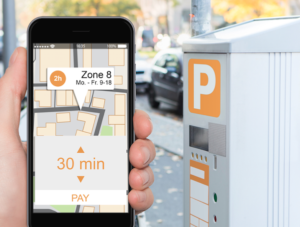You made great time getting onto campus or to the office. You’ve got plans to get in early and leave a few minutes early to get to the beach before dark. A smile strikes your face as you think of your day ahead. Amidst a daydream, you’re brought back to reality after realizing you’ve circled the parking garage three times already.
Soon enough, you’re cursing the guy flashing his four-ways in front of you and the day’s plan is ruined. You’ve become a statistic among drivers who spend hours upon hours scouring lots for parking spots.
On average, motorists in America lose 17 hours a year when searching for parking, according to a study by INRIX Research. However, that number increases for drivers in other locales. For example, drivers in New York City spend nearly five days looking for spots. This doesn’t change much in Los Angeles where individuals have lost just less than four days to old methods of parking.
Parking availability or the lack thereof, can make or break anyone’s day—or entire year for that matter. These hours wasted could have been put toward a favorite activity, achieving better timeliness, proper parking, or money savings.
Luckily, after years of road rage, parking professionals have heard these complaints and answered with improved, more efficient parking options. The leaders of this industry have found that the amount of parking is (for the most part) quite sufficient—the problem actually lies with how this space is used. As a result, drivers everywhere will be able to recapture lost time and schedule new activities accordingly.
With improvement occurring in the parking industry, drivers who once lost days of their lives can now schedule a trip, see new sites, and engage in their favorite pastimes. More importantly, these people can enjoy their daily commute and reduce stress stemming from ill-prepared parking facilities.
When parking isn’t a worry, the reduction in stress can have lasting effects on the human body. Stress is the source of high blood pressure, increased chance of a heart attack, and a weak immune system. Relieving the stress caused by inefficient parking may be an avenue toward a healthier lifestyle.
On a less stressful and quicker commute, drivers everywhere will soon reap the benefits of organized parking practices. As it is, 42% of individuals say that they’ve missed appointments after unsuccessfully searching for a spot. However, as parking areas install guidance systems and implement pre-paid parking applications, the chances that motorists show up late to work, class, or an event will decrease significantly.
What’s more, with an increased amount of time, drivers can focus on the act of parking, rather than rushing off to their destination. More than half of vehicle break-ins occur after drivers leave their autos unlocked or have left valuables in plain sight. When motorists are allotted ample parking time, they will have a chance to stop in an area where their car is not subject to being struck or broken into.
At the end of the day, time is most certainly money. With more time, drivers will be able to see increased levels of savings. Last year, the average American driver wasted $345 in time, fuel, and emissions when parking spots were scarce. With new technology allowing for updated parking availability in real time, parking will no longer be a search and much more of a guarantee.

